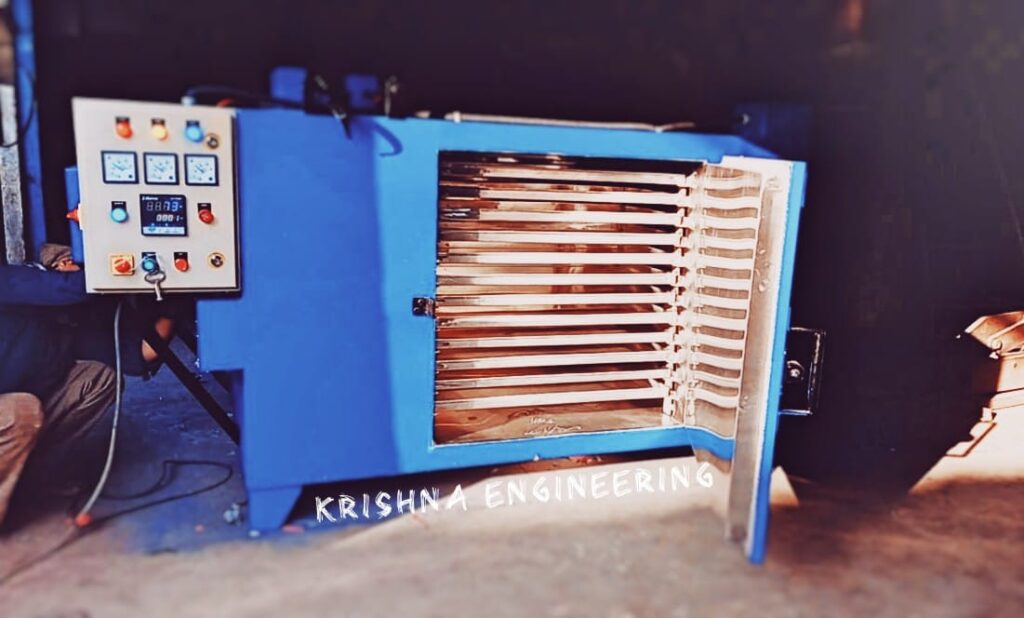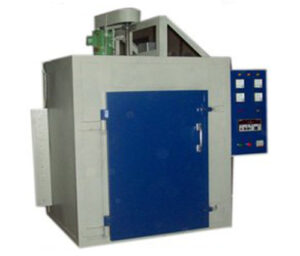What is a Tray Pharmaceutical dryer?
In the pharmaceutical industry, the drying process is used to reduce or remove water or other types of solvents, which could cause chemical and microbiological deterioration of the final drug, by using pharmaceutical drying equipment.

A pharmaceutical tray dryer is a specific type of tray dryer designed for drying pharmaceutical products and materials in the pharmaceutical industry. These dryers are utilized to remove moisture or solvents from pharmaceutical substances, ensuring the stability, quality, and efficacy of the final pharmaceutical products.
Pharmaceutical Tray Dryer with Electrical Hot Air Heater base has many benefits. The foremost benefit is that it facilitates quick drying of chemical substances without increasing the temperature of the samples. When the compound is heated, it usually breaks down into small particles that escape out through the vents or escape with the help of steam vapor. Hence, it is important to have good quality trays for continuous drying. This can be effectively achieved with the help of electrical heating systems.
Here are some key features and considerations specific to pharmaceutical tray dryers:
Material Compatibility: Pharmaceutical tray dryers are constructed using materials that are compatible with pharmaceutical substances. The drying chamber and trays are typically made of stainless steel or other sanitary and corrosion-resistant materials to meet the stringent cleanliness and hygiene requirements of the pharmaceutical industry.
Compliance with Regulations: Pharmaceutical tray dryers are designed to comply with pharmaceutical industry regulations and guidelines, such as Good Manufacturing Practices (GMP) and other regulatory standards like the U.S. Food and Drug Administration (FDA) guidelines. They adhere to strict hygiene standards, traceability requirements, and documentation practices.
Contamination Control: Pharmaceutical tray dryers are designed to prevent cross-contamination between different pharmaceutical products. Separate trays or dedicated drying chambers may be used to ensure that different products do not come into contact with each other during the drying process, minimizing the risk of contamination.
Temperature and Humidity Control: Precise temperature and humidity control are essential in pharmaceutical drying processes. Pharmaceutical tray dryers have accurate temperature and humidity control systems to maintain the desired drying conditions, which are critical for achieving consistent drying results and preserving the quality of pharmaceutical materials.
Airflow Control: Pharmaceutical tray dryers incorporate advanced airflow control mechanisms to ensure uniform and controlled airflow throughout the drying chamber. Proper airflow distribution helps to optimize the drying process, ensuring efficient moisture removal and preventing the formation of hot spots or uneven drying.
Monitoring and Control Systems: Pharmaceutical tray dryers often feature advanced monitoring and control systems. This includes sensors for temperature, humidity, air velocity, and monitoring devices for process parameters. These systems enable real-time monitoring, precise control, and documentation of the drying process, ensuring compliance with pharmaceutical standards and facilitating quality assurance.
Safety Features: Pharmaceutical tray dryers incorporate safety features to protect operators, products, and the environment. These may include explosion-proof electrical components, safety interlocks, emergency shut-off systems, and appropriate ventilation or filtration systems to handle any hazardous or volatile substances released during the drying process.
Pharmaceutical tray dryers play a critical role in pharmaceutical manufacturing by providing efficient and controlled drying processes that meet the industry’s stringent requirements. They contribute to the production of high-quality, stable, and safe pharmaceutical products by ensuring the removal of moisture or solvents while maintaining the integrity of the materials.
Worldwide Exports Location:
Following Countries: Afghanistan, Albania, Algeria, Andorra, Angola, Antigua And Barbuda, Argentina, Armenia, Australia, Austria, Azerbaijan, Bahamas, Bahrain, Bangladesh, Barbados, Belarus, Belgium, Belize, Benin, Bhutan, Bolivia, Bosnia And Herzegovina, Botswana, Brazil, Brunei, Bulgaria, Burkina Faso, Burundi, Cabo Verde, Cambodia, Cameroon, Canada, Central African Republic (CAR), Chad, Chile, Colombia, Comoros, Democratic Republic Of The Congo, Republic Of The Congo, Costa Rica, Cote D’Ivoire, Croatia, Cuba, Cyprus, Czech Republic, Denmark, Djibouti, Dominica, Dominican Republic, Ecuador, Egypt, El Salvador, Equatorial Guinea, Eritrea, Estonia, Ethiopia, Fiji, Finland, France, Gabon, Gambia, Georgia, Germany, Ghana, Greece, Grenada, Guatemala, Guinea, Guinea-Bissau, Guyana, Haiti, Honduras, Hungary, Iceland, India, Indonesia, Iran, Iraq, Ireland, Israel, Italy, Jamaica, Japan, Jordan, Kazakhstan, Kenya, Kiribati, Kosovo, Kuwait, Kyrgyzstan, Laos, Latvia, Lebanon, Lesotho, Liberia, Libya, Liechtenstein, Lithuania, Luxembourg, Macedonia (FYROM), Madagascar, Malawi, Malaysia, Maldives, Mali, Malta, Marshall Islands, Mauritania, Mauritius, Mexico, Micronesia, Moldova, Monaco, Mongolia, Montenegro, Morocco, Mozambique, Myanmar (Burma), Namibia, Nauru, Nepal, Netherlands, New Zealand, Nicaragua, Niger, Nigeria, North Korea, Norway, Oman, Pakistan, Palau, Palestine, Panama, Papua New Guinea, Paraguay, Peru, Philippines, Poland, Portugal, Qatar, Romania, Russia, Rwanda, Saint Kitts And Nevis, Saint Lucia, Saint Vincent And The Grenadines, Samoa, San Marino, Sao Tome And Principe, Saudi Arabia, Senegal, Serbia, Seychelles, Sierra Leone, Singapore, Slovakia, Slovenia, Solomon Islands, Somalia, South Africa, South Korea, South Sudan, Spain, Sri Lanka, Sudan, Suriname, Swaziland, Sweden, Switzerland, Syria, Taiwan, Tajikistan, Tanzania, Thailand, Timor-Leste, Togo, Tonga, Trinidad And Tobago, Tunisia, Turkey, Turkmenistan, Tuvalu, Uganda, Ukraine, United Arab Emirates (UAE), United Kingdom (UK), United States Of America (USA), Uruguay, Uzbekistan, Vanuatu, Vatican City (Holy See), Venezuela, Vietnam, Yemen, Zambia, Zimbabwe.
India Location –
Maharashtra, Mumbai, Pune, Nagpur, Nashik, Virar, Palghar, Aurangabad, Bhiwandi, Thane, Amravati, Malegaon, Kolhapur, Nanded, Sangli ,Jalgaon, Akola, Latur, Ahmadnagar, Dhule, Ichalkaranji, Chandrapur, Parbhani, Jalna, Bhusawal, Navi Mumbai, Raigad, Panvel, Bangalore, Karnataka, Ahmedabad, Gujarat, Chennai, Tamil Nadu, Surat, Coimbatore, Vadodara, Indore, Madhya Pradesh, Bhubaneswar, Orissa, Hyderabad, Andhra Pradesh, Jamshedpur, Jharkhand, Kolkata, West Bengal ,Delhi, Jaipur, Rajasthan, Kochi, Kerala, Chandigarh, Punjab, Dehradun, Uttarakhand , Lucknow, Uttar Pradesh, Visakhapatnam, Andhra Pradesh, Guwahati, Assam, Amritsar, Mangalore, Noida, Gurgaon, Haryana, Bhopal, Madhya Pradesh, Aurangabad, Faridabad, Allahabad, Prayagraj, Jodhpur.




